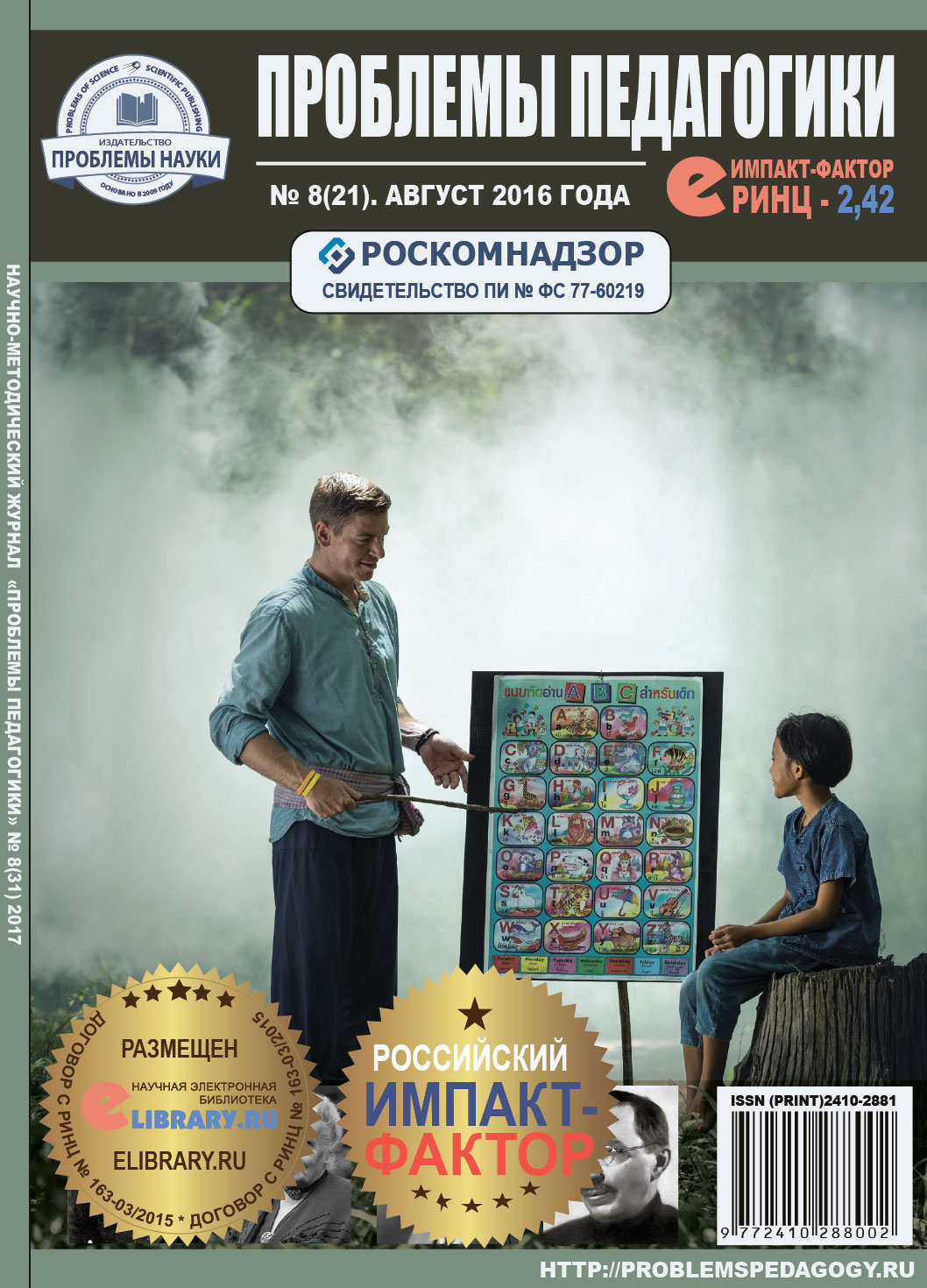Ошибка
Could not load feed: http://www.edu.ru/news/education/feed.rss
Проблемы педагогики
Ibragimova D.Sh., Zainieva N.B.
Ibragimova Dildora Shamsiddinovna - Senior Lecturer;
Zainieva Nasiba Bakhtiyarovna - Senior Lecturer,
DEPARTMENT OF UZBEK AND FOREIGN LANGUAGES,
SAMARKAND STATE INSTITUTE OF ARCHITECTURE AND CIVIL ENGINEERING,
SAMARKAND, REPUBLIC OF UZBEKISTAN
Abstract: the relevance of the study is due to the expressed interest in modern educational practice in the implementation of the requirements for training specialists who can withstand competition in the labor market. The article discusses the problem of creating an educational environment with the aim of forming the professional competence of students. The necessity of introducing e-learning into the educational process is considered. Attention is paid to the integrated educational environment of the university, the study of which in modern conditions of modernization of higher education has both theoretical and applied value.
Keywords: integrated educational environment; educational process, vocational training; e-learning.
References
- Medvedeva M.S. Integrated educational environment - a necessary condition for blended learning // Modern studies of social problems (electronic scientific journal). № 10 (18), 2012.
- Nikolina V.V. Sociocultural practice as a vector of development of the modern educational space // Scientific dialogue, 2017. № 2. S. 269-280.
- Rizayev J.A., Pŭlatov O.A. Ŭkˌituvchi portfoliyasi va tekhnologiyasi // Sbornik uchebno-nauchno-prakticheskoy konferentsii “Obshcheniye patsiyentom, problemy obucheniya prakticheskikh navykov i ikh resheniye pri podgotovke kvalifitsirovannykh spetsialistov. Tashkent, 2018. S. 2-3.
- Rizayev J.A., Yusupalikhodzhayeva S.Kh. Kasbiy fanlarda nazariya va amaliyot uyġunligi// Sbornik uchebno-nauchno-prakticheskoy konferentsii “Obshcheniye patsiyentom, problemy obucheniya prakticheskikh navykov i ikh resheniye pri podgotovke kvalifitsirovannykh spetsialistov. Tashkent, 2018. S. 160-162.
- Toktarova V.I. The development of the information and educational environment of a modern university in the context of pedagogical innovations // Innovations in Education, 2016. № 6. P. 103–115.
- Razykova L.T., Igamova I.S. Shirokiye vozmozhnosti dlya individualizatsii obucheniya // Problemy biologii i meditsiny, 2016. № 2. S. 1.
- Razykova L.T., Igamova I.S., Muratova Sh.N. Rol' psikhologicheskoy atmosfery sem'i v stanovlenii i razvitii lichnosti // Nauka i obrazovaniye segodnya, 2019. № 11 (46).
Ссылка для цитирования данной статьи
| Тип лицензии на данную статью – CC BY 4.0. Это значит, что Вы можете свободно цитировать данную статью на любом носителе и в любом формате при указании авторства. | ||
|
Ibragimova D.Sh., Zainieva N.B. EDUCATIONAL PROCESS IN INTEGRATED EDUCATIONAL ENVIRONMENT // Проблемы педагогики 2020, № 3(48). - С. {см. журнал}. |
||
- Информация о материале
- Категория: 13.00.08 Теория и методика профессионального образования
- Просмотров: 1256
Sultanova S.
Sultanova Saida – Teacher, DEPARTMENT OF THEORETICAL DISCIPLINES OF THE ENGLISH LANGUAGE, PHILOLOGY FACULTY, UZBEKISTAN STATE WORLD LANGUAGES UNIVERSITY, TASHKENT, REPUBLIC OF UZBEKISTAN
Abstract: the article manages the interrelations between the hypothesis of scholarly interpretation and the hypothesis and history of writing. It is presented to advance those interrelations literally, just as a student of history of writing should take into thought the formal and semantic explicitness of scholarly interpretation, in particular the dynamic intricacy of the exchange of propositional and meta-propositional meaning of the first content into the interpreted content, the previous being associated with the last by the rule of "congruity" (L.V. Kushnina).
Keywords: literary translation, field of study, career in literary translation, interdisciplinary, art history, poetics, translation tool.
References
- Bakhtin M.M. Literary critical articles. M., 1986.
- Dijk T.A. the van. Tongue. Cognition. Communication. Blagoveshchensk, 2000.
- Kostionova M.V. The literary reputation of a writer in Russia: translation as reflection and formation factor (Russian translations of the novel by C. Dickens squeaks of the Pickwick Club "): dis. ... K. filol. N.: 01/10/08. M., 2015.
- Kushnina L.V., Raskopina L.P. Study of translation harmony in aksyological paradigm // Philological sciences. Questions of theory and practice. 2015. No. 7 (49). Part 1. P. 115–118.
- Leontiev K.I. Universals of poetic (poetic) translation (in the material of Russian translations from English poetry of the XX century): author. dis ....K. Filol. n .: 10.02.20. Tver, 2013.
- Lotman Yu.M. Lectures on structural poetics // Yu.M. Lotman and Tartu Sko-Moscow semiotic school. M., 1994. S. 11–263.
- Paducheva E.V. Statement and its correlation with reality. M., 1985.
- Sdobnikov V.V. Translation theory. M., 2007.
Ссылка для цитирования данной статьи
| Тип лицензии на данную статью – CC BY 4.0. Это значит, что Вы можете свободно цитировать данную статью на любом носителе и в любом формате при указании авторства. | ||
|
Sultanova S. LITERARY TRANSLATION AND ITS RELATION TO HISTORY // Проблемы педагогики 2020, № 3(48). - С. {см. журнал}. |
||
- Информация о материале
- Категория: 13.00.05 Теория, методика и организация социально-культурной деятельности
- Просмотров: 1401





